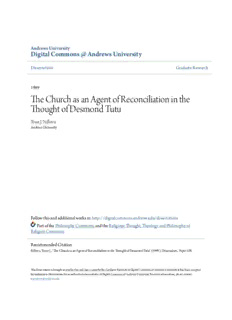
The Church as an Agent of Reconciliation in the Thought of Desmond Tutu PDF
Preview The Church as an Agent of Reconciliation in the Thought of Desmond Tutu
AAnnddrreewwss UUnniivveerrssiittyy DDiiggiittaall CCoommmmoonnss @@ AAnnddrreewwss UUnniivveerrssiittyy Dissertations Graduate Research 1999 TThhee CChhuurrcchh aass aann AAggeenntt ooff RReeccoonncciilliiaattiioonn iinn tthhee TThhoouugghhtt ooff DDeessmmoonndd TTuuttuu Trust J. Ndlovu Andrews University Follow this and additional works at: https://digitalcommons.andrews.edu/dissertations Part of the Philosophy Commons, and the Religious Thought, Theology and Philosophy of Religion Commons RReeccoommmmeennddeedd CCiittaattiioonn Ndlovu, Trust J., "The Church as an Agent of Reconciliation in the Thought of Desmond Tutu" (1999). Dissertations. 108. https://digitalcommons.andrews.edu/dissertations/108 This Dissertation is brought to you for free and open access by the Graduate Research at Digital Commons @ Andrews University. It has been accepted for inclusion in Dissertations by an authorized administrator of Digital Commons @ Andrews University. For more information, please contact [email protected]. Thank you for your interest in the Andrews University Digital Library of Dissertations and Theses . Please honor the copyright of this document by not duplicating or distributing additional copies in any form without the author’s express written permission. Thanks for your cooperation. INFORMATION TO USERS This manuscript has been reproduced from the microfilm master. UMI films the text directly from the original or copy submitted. Thus, some thesis and dissertation copies are in typewriter face, while others may be from any type of computer printer. The quality of this reproduction is dependent upon the quality of the copy submitted. Broken or indistinct print, colored or poor quality illustrations and photographs, print bieedthrough, substandard margins, and improper alignment can adversely affect reproduction. In the unlikely event that the author did not send UMI a complete manuscript and there are missing pages, these will be noted. Also, if unauthorized copyright material had to be removed, a note will indicate the deletion. Oversize materials (e.g., maps, drawings, charts) are reproduced by sectioning the original, beginning at the upper left-hand comer and continuing from left to right in equal sections with small overlaps. Photographs included in the original manuscript have been reproduced xerographically in this copy. Higher quality 6" x 9" black and white photographic prints are available for any photographs or illustrations appearing in this copy for an additional charge. Contact UMI directly to order. Bell & Howell Information and Learning 300 North Zeeb Road, Ann Arbor, Ml 48106-1346 USA UMT 800-521-0600 Reproduced with permission of the copyright owner. Further reproduction prohibited without permission. Reproduced with permission of the copyright owner. Further reproduction prohibited without permission. Andrews University Seventh-day Adventist Theological Seminary THE CHURCH AS AN AGENT OF RECONCILIATION IN THE THOUGHT OF DESMOND TUTU A Dissertation Presented in Partial Fulfillment of the Requirements for the Degree Doctor of Theology by Trust J. Ndlovu October 1999 Reproduced with permission of the copyright owner. Further reproduction prohibited without permission. UMI Number 9956005 Copyright 1999 by Ndlovu, Trust Japheth All rights reserved. __ ___ __<g> UMI UMI Microform9956005 Copyright 2000 by Bell & Howell Information and Learning Company. All rights reserved. This microform edition is protected against unauthorized copying under Title 17, United States Code. Bell & Howell Information and Learning Company 300 North Zeeb Road P.O. Box 1346 Ann Arbor, Ml 48106-1346 Reproduced with permission of the copyright owner. Further reproduction prohibited without permission. ® Copyright by Trust J. Ndlovu 1999 All Rights Reserved Reproduced with permission of the copyright owner. Further reproduction prohibited without permission. THE CHURCH AS AN AGENT OF CONCILIATION IN THE THOUGHT OF DESMOND TUTU A dissertation presented in partial fulfillment of the requirements for the degree Doctor of Theology by Trust J. Ndlovu APPROVAL BY THE COMMITTEE: (AjJ, Faculty Adviser, Ph.DTTh Raoul Dederen W.Y Professor of Theology, Emeritus Denis Foitii »rol Russell L. Staples Professor of Missions, Emeritus Atilio Professorr ooffZZhheeoollooggyy . 0 Peter Walshe Date approved Professor of Government University of Notre Dame Reproduced with permission of the copyright owner. Further reproduction prohibited without permission ABSTRACT THE CHURCH AS AN AGENT OF RECONCILIATION IN THE THOUGHT OF DESMOND TUTU by Trust J. Ndlovu Adviser: Raoul Dederen Reproduced with permission of the copyright owner. Further reproduction prohibited without permission. ABSTRACT OF GRADUATE STUDENT RESEARCH Dissertation Andrews University Seventh-day Adventist Theological Seminary Title: THE CHURCH AS AN AGENT OF RECONCILIATION IN THE THOUGHT OF DESMOND TUTU Name of researcher: Trust J. Ndlovu Name and degree of faculty adviser: Raoul Dederen, Dr. esc-Sc. Morales Date completed: October 1999 South Africa was both the first and last bastion of extended European colonial rule in Sub-Saharan Africa. Due to the extensive interaction between the Black and White races over time, who were distinguished by divergent philosophies of life, friction developed between these two major ethnic blocs, as well as the other peoples that came as labor for the Whites or have arisen as a result of miscegenation between the Blacks and the Whites. Archbishop Desmond Tutu holds that racial tension is neither good for South Africa nor even Christian, and insists that it should be eliminated, giving way to reconciliation. The purpose of this research was to set forth, analyze, and evaluate Tutu’s view of the church as a reconciler of alienated people. To attain this goal, Tutu’s convictions were considered in the context of his doctrine of the church against the backdrop of his view of the Reproduced with permission of the copyright owner. Further reproduction prohibited without permission.
Description: